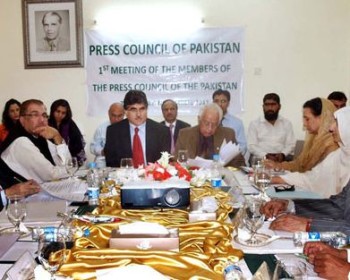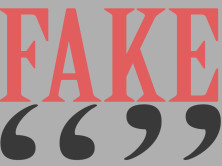
A fall 2011 meeting of the Pakistan Press Council. (Credit: The News, screenshot detail)
The crime and court beats are considered some of the most difficult parts of journalism in every part of the world, but journalists in Pakistan mostly depend upon the police and intelligence agencies for 90 percent of the information they use in their news stories.
A recent seminar on media ethics was organized by the Islamabad Bar Association in collaboration with Press Council of Pakistan (PCP) for crime and court reporters of Rawalpindi and Islamabad. The Jan. 5 seminar was first of its kind in Pakistan.
iMediaEthics contacted senior journalists and lawyers to get feedback on the seminar, including Pakistan Federal Union of Journalists (PFUI) Secretary General, Muhammad Amin Yousaf. Yousaf said by phone:
“This initiative of the seminar was taken on the recommendations and directions of Pakistan Federal Union of Journalists (PFUJ) and such kinds of seminars and workshops have been scheduled by the federation for the capacity building and training of the journalists in future.”
Amin explained that crime and court beats are very difficult in this part of world because journalists have to face a number of threats and challenges from the police and intelligence agencies and other state actors while performing their professional responsibilities of reporting.
Media Ethics difficult to deploy due to threats and pressures
Amin added:
“There are pressure groups from the political parties, government, media houses and media moguls who are not in the interest of the objective reporting, as they have their own agenda and vested interests.”
PFUJ has a 13-point code of conduct that was created back in 1950. The Press Council of Pakistan has the same code of conduct.
When iMediaEthics asked about any amendment in the code of conduct, he said there weren’t any as of yet. He explained: “After every two years the elected office bearers of PFUJ reviewed these codes of conducts and if there is necessary then they delegate the amendments in these ethics and code of conducts.”
Amin also urged for
• Professional training of the journalists who are being recruited for the crime and court reporting for the newspapers and television channels and criticized the non professional crew of the various news organizations.
• Reduced impact of media moguls who have vested interests and who are violating the PFUJ code of conduct and media ethics.
When asked if there was a difference between the codes of conduct and ethics for Pakistan crime and court beats and that of what’s found in developed countries Amin said: “The journalists of the developed countries have not such kinds of problems which we are facing.” However, he added that he found the media in developed and Western countries to be both biased and anti-Pakistan.
Pakistan reporters are dependent on government sources
Amin confirmed again that the most the information provided to the crime and court reporters in Pakistan is shared with them by the police or some other intelligence agencies, whereas in the Western journalists would have more independent sources.
iMediaEthics contacted a member of the governing body Crime and Court Reporters Association, Rawalpindi. The member, Faisal Kamal Pasha, who has been also working as a Court Reporter for a leading English daily, the News, said: “This is the first ever seminar or conference on the subject of the training the ethics to the Crime and Court reporters is a very encouraging step towards the healthy journalism and reporting.”
Pasha said that there is a strong need for such kind of workshops and seminars for crime and court reporters because they should have to report crime and court news with full objectivity and above their personal affiliations to any political or religious groups.
The chairman of the Press Council of Pakistan, Raja Muhammad Shafqat Abbasi, said: “We are trying to implement the code of conduct for the journalists and these seminar and workshops are the process of the capacity building and enforcement of media ethics in Pakistan.” The council is a newly formed organization working with limited resources and funds due to the lack of interest by the government and newspaper owners, according to Abbasi.
Abbasi said, “We are at the preliminary stage as Pakistan is very late even in South Asia. The Press Council in India was formed in 1965 and in Bangladesh it was established in 1975, so we are the position of take off now in 2011.”
More media ethics seminars soon
Abbasi said the Press Council of Pakistan is planning more seminars for crime and courts journalists in the other cities of Pakistan with the help of various university journalism departments and lawyer organizations.
He stressed the need of these workshops and short courses for court reporters. According to Abbasi, because court reporters often don’t have any law background, they should be taught the basic information about the law and court reporting in one or two month courses.
Abbasi added that still a lot of things are in pipeline and pending implementation for media ethics and code of conduct for the journalists in Pakistan.
Abbasi started his position as chairman of the press council on Nov 1, 2011.
Pakistan journalists need to know the law
We also asked Islamabad High Court Bar Association President, Choudhary Muhammad Ashraf Gujjar, about the seminar on crime reporting. He said: “The Court reporters should have knowledge of Civil, Criminal, Services, Banking and other laws for which they are reporting the Court legal proceedings. But unfortunately here in Pakistan this is not the practice by the newspapers owners and journalists.”
Gujjar said that newspapers owners and the journalists bodies need to collaborate with the Bar Associations or Federal Judicial Academy for short courses on responsible reporting in the field of court and crime reporting.
When asked about the difference between court reporting here in Pakistan and other countries Gujjar said: “In foreign [countries] the Crime and Court reporters have expertise on law and they have refreshers courses time to time, which practice have been not seen yet in Pakistan, that’s why our Crime and Court reporting need a lots of improvement especially what they have to report and what they don’t to publish.”







Comments Terms and Conditions